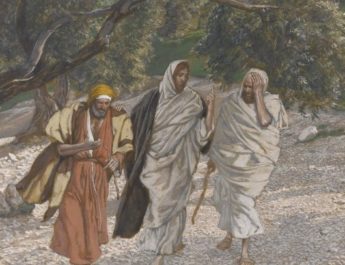Acts 2:43-47
A Women’s Lectionary 30
43 AweA cameB upon everyoneC because manyD wondersE
A “awe” = phobos. From phebomai (to flee, withdraw, be put to flight). This is panic flight, fear, fear being caused, terror, alarm, that which causes fear, reverence, respect.
B “came” = ginomai. This is to come into being, to happen, become, be born. It can be to emerge from one state or condition to another or is coming into being with the sense of movement or growth.
C “everyone” = pas + psuche. Pas is all or every. Psuche is from psucho (to breathe, blow). This is breath, the breath of life, the self, individual, soul. This is the word for that which makes a person unique – their identity, will, personality, affections. This isn’t the soul as the immortal part of us, but as our individuality. It is also not life as a general concept, but specific to people. This is where the words psyche and psychology come from.
D “many” = polus. This is much, often, plenteous – a large number or a great extent.
E “wonders” = teras. 16x in NT. This is a wonder or marvel performed to get bystanders to react. It could also be a portent or omen.
and signsF were being doneG through the apostles.H
F “signs” = semeion. From the same as semaino (to give a sign, signify, indicate, make known); from sema (a sign or mark). It is literally a sign of any kind. It also refers to a sign given by God to confirm or authenticate a message or prophecy. It is not necessarily miraculous, but it can be. The Gospel of John generally uses this word instead of miracle.
G “being done” = ginomai. Same as “came” in v43. See note B above.
H “apostles” = apostolos. From apostello (to send, send away, send forth as a messenger, to commission); {from apo (from, away from) + stello (to set, arrange, prepare, provide for); {probably from histemi (to stand, place, set up, establish, stand firm)}}. This is a messenger – someone sent out on a mission as an envoy or delegate. It can also refer to someone set at liberty. Generally, this is a messenger who is meant to be a representative of the one who sent them. They are thus, set apart on a mission literally or figuratively.
44 AllI who believedJ were together and had all thingsK in common;L
I “all” = pas. Same as “everyone” in v43. See note C above.
J “believed” = pistueo. From pistis (faith, faithfulness, belief, trust, confidence; to be persuaded or come to trust); from peitho (to have confidence, urge, be persuaded, agree, assure, believe, have confidence, trust). This is to believe, entrust, have faith it, affirm, have confidence in. This is less to do with a series of beliefs or doctrines that one believes and more to do with faithfulness, loyalty, and fidelity. It is trusting and then acting based on that trust.
K “all things” = hapas. Related to “everyone” in v43. From hama (at once, together with) + pas (see note C above) OR from a (with) + pas (see above). This is all; every part working together as a unit.
L “in common” = koinos. 14x in NT. From sun (with, together with). This is common, shared – something for ordinary or everyday use. It can also denote unclean, unholy, or profane – unholy rather than something reserved for a sacred purpose.
45 they would sellM their possessionsN and goodsO and distributeP the proceeds to all, as any had need.Q
M “sell” = piprasko. 9x in NT. From pernemi (to sell by export). This is to sell with travel involved. It can also mean to sell into slavery or to be devoted to.
N “possessions” = ktema. 4x in NT. From ktaomai (to get, purchase, possess). This is a possession as something acquired. It particularly refers to field or property that is land.
O “goods” = huparxis. 2x in NT. From huparcho (to begin or be ready, to exist or possess; what one already has or possesses); {from hupo (by, under, about, subordinate to) + archo (to rule, begin, have first rank or have political power)}. This is a possession that is at your own disposal and is available to you. It is possessions, goods, wealth, or property.
P “distribute” = diamerizo. 12x in NT. From dia (through, across to the other side, thoroughly) + merizo (to divide, part, share, distribute, assign; figuratively, to differ); {from meros (part, share, portion figurative or literal); from meiromai (to get your share, receive one’s allotment)}. This is to divide up, distribute, or share. Figuratively, it can mean dissension.
Q “need” = chreia. From chraomai (to use, make use of, give what is needed, act in a specific way, request); related to chre (what is proper, fitting, or necessary). This is the is task, business, or affair. It can also be need, want, or destitution.
46 DayR by day, as they spent much timeS togetherT in the temple,U
R “day” = hemera. Perhaps from hemai (to sit). This is day, time, or daybreak.
S “spent much time” = proskartereo. 10x in NT. From pros (at, to, toward, with) + kartereo (to be strong, endure; figuratively to be steadfast, to persevere, to be patient); {from kratos (strength, power, dominion; vigor in a literal or figurative sense; power that is exercised)}. This is to show strength consistently in the face of trials. It can also mean to persist, stand ready, be earnest, or attend to something.
T “together” = homothumadon. 11x in NT. From homou (together); {from homos (the same)} + thumos (passion, wrath; actions emerging from passion or impulse) {from thuo (to rush along, breathe violently, offer sacrifice)}}. This is having one mind or a shared passion. It is people who share the same desire.
U “temple” = hieron. From hieros (sacred, something sacred, temple, holy, set apart; something consecrated to a god). This is the word for temple.
they brokeV breadW at homeX and ateY their foodZ
V “broke” = klao. 14x in NT. This is to break, to break in pieces as one breaks bread.
W “bread” = artos. Perhaps from airo (raise, take up, lift, remove). This is bread or a loaf. It is a loaf as raised.
X “home” = oikos. This is house – the building, the household, the family, descendants, the temple.
Y “ate” = metalambano. 7x in NT. From meta (with among, behind, beyond; implies a change following contact or action) + lambano (active acceptance/taking of what is available or what has been offered; emphasizes the choice and action of the individual). This is take or partake, to share, or participate.
Z “food” = trophe. 16x in NT. Perhaps from trepho (to bring up, rear, nourish, fatten, nurse; properly, to enlarge through proper nourishment). This is nourishment in a literal or figurative sense. By implication, it can be ration or wages.
with gladAA and generousBB hearts,CC
AA “glad” = agalliasis. 5x in NT. From agalliao (joy that prompts you to jump up. It is a full body experience of joy: exulting, rejoicing, or even boasting from joy); from agallomai (to exalt, make glorious) {from agan (much, very) + hallomai (to leap or leap up; when referring to water, springing up or bubbling up; to jump or figuratively to gush)}. This is exultation, wild joy, exhilaration, gladness, or welcome.
BB “generous” = aphelotes. 1x in NT. From apheles (no stone – even or smooth); {from a (not, without) + phellos (a stone; something that one stubs their foot on)}. This is lacking rocks – being level or smooth. Figuratively, it refers to things being uncomplicated or lacking a stumbling block. So, it can be simplicity or sincerity.
CC “hearts” = kardia. Literally the heart, but figuratively mind, character, inner self, will, intention, thoughts, feelings. Also, the center of something. The word heart is only used figuratively in the Old and New Testaments. This is where “cardiac” comes from.
47 praisingDD GodEE and having the goodwillFF of allGG the people.HH
DD “praising” = aineo. 8x in NT. From ainos (praise, saying, story, proverb). This is to praise.
EE “God” = Theos. From Proto-Indo-European origins, meaning do, put, place. This is God or a god in general.
FF “goodwill” = charis. From chairo (to rejoice, be glad; used to say hello; properly, delighting in the grace of God or experiencing God’s favor); from char– (to extend favor, lean towards, be inclined to be favorable towards). This is grace, kindness, favor, gratitude, thanks. It is the sense of being inclined to or favorable towards – leaning towards someone to share some good or benefit. This can be literal, figurative, or spiritual. It is grace as abstract concept, manner, or action.
GG “all” = holos. This is whole, complete, or entire. It is a state where every member is present and functioning in concert. This is the root of the word “whole.”
HH “people” = laos. This is the people or crowd – often used for the chosen people. This is where the word “laity” comes from.
And day by day the LordII addedJJ to their number those who were being saved.KK
II “Lord” = Kurios. From kuros (authority, supremacy). This is a respectful address meaning master or sir. It refers to one who has control or power greater than one’s own. So, it was also applied to God and Jesus as Master or Lord.
JJ “added” = prostithemi. 18x in NT. From pros (at, to, toward, with) + tithemi (to put, place, set, fix, establish in a literal or figurative sense; properly, this is placing something in a passive or horizontal position). This is to add, place to, bring together for a reason, or add up.
KK “saved” = sozo. From sos (safe, rescued, well). This is to save, heal, preserve, or rescue. Properly, this is taking someone from danger to safety. It can be delivering or protecting literally or figuratively. This is the root that “savior” and “salvation” come from in Greek.
Image credit: “Light and Dust Wrapping” by Aurélien Adoue, 2018.




